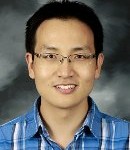 The Graduate School is pleased to announce the recipients of the fall 2012 finishing fellowships. The fellowships were made available by the support of the Graduate School. Among the recipients is physics graduate student Xiaoliang Zhong.
The Graduate School is pleased to announce the recipients of the fall 2012 finishing fellowships. The fellowships were made available by the support of the Graduate School. Among the recipients is physics graduate student Xiaoliang Zhong.
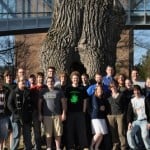 Once again the Michigan Tech chapter of the Society of Physics Students (SPS) has been selected as one of the Outstanding SPS Chapters. This is the third year in a row for such a distinction with this chapter.
Once again the Michigan Tech chapter of the Society of Physics Students (SPS) has been selected as one of the Outstanding SPS Chapters. This is the third year in a row for such a distinction with this chapter.
The Michigan Tech chapter is part of Zone 09. The award criteria include K-12 outreach, community service, interactions with alumni, and other considerations.
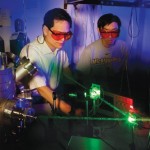 Yap, Lee Honored for Nanotube Discoveries
Yap, Lee Honored for Nanotube Discoveries
For groundbreaking work in nanotechnology, Yoke Khin Yap and Chee Huei Lee have received Michigan Tech’s Bhakta Rath Research Award.
The award, endowed by 1958 alumnus Bhakta Rath and his wife, Shushama Rath, recognizes a Michigan Tech doctoral student and advisor for “exceptional research of particular value that anticipates the future needs of the nation while supporting advances in emerging technology.”
Read more at Michigan Tech Magazine, by Marcia Goodrich.
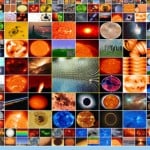 CS Faculty/Students Win Best Paper Award
CS Faculty/Students Win Best Paper Award
Computer Science Assistant Professor Chaoli Wang, former CS undergraduate student John Reese, former CS MS student Huan Zhang, CS PhD student Jun Tao, and Physics Professor Robert Nemiroff will receive a Best Paper Award for their paper, “iMap: A stable layout for navigating large image collections with embedded search”, at the IS&T/SPIE Conference on Visualization and Data Analysis, Feb. 4-6, 2013, in Burlingame, Calif. Jun Tao will present the award paper at the conference.
For their next steps, the authors will further develop techniques for animated transition and graph-based image layout, deploy the visualization results on the display wall at the Immersive Visualization Studio (IVS) at the Center for Computer Systems Research (CCSR) for outreach, and eventually release a web-based online program to benefit a wider user base.
From Tech Today.
 Two teams from Michigan Tech have been chosen to join in the Michigan Clean Energy Venture Challenge. One of the teams is GreenedIt!, a web-based application for energy auditing.
Two teams from Michigan Tech have been chosen to join in the Michigan Clean Energy Venture Challenge. One of the teams is GreenedIt!, a web-based application for energy auditing.
GreenedIt! team members are physics students Travis Beaulieu, an undergraduate, and graduate student Abhilash Kantamneni. The team traveled to East Lansing for their initial training this past weekend.
“The training we received through the challenge was incredibly useful,” said Beaulieu. “The whole point was to try and get young entrepreneurs into the mindset of finding a customer need and forming the idea around the customer’s feedback. Thankfully this training worked for our team, and we had a complete pivot during the weekend.”
Read more at Tech Today, by Dennis Walikainen.
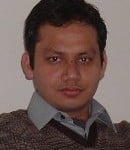 Physics graduate student Pradeep Kumar is a a recipient of the Dean’s Award for Outstanding Scholarship. Kumar was nominated by the Department of Physics. A certificate of recognition for this award will be presented at the Graduate Research Colloquium Banquet that is held in the spring.
Physics graduate student Pradeep Kumar is a a recipient of the Dean’s Award for Outstanding Scholarship. Kumar was nominated by the Department of Physics. A certificate of recognition for this award will be presented at the Graduate Research Colloquium Banquet that is held in the spring.
Physics graduate student Xiaoliang Zhong and Engineering Physics graduate student Pradeep Kumar have been offered Finishing Fellowships from the Michigan Tech Graduate School. The fellowships provide support to PhD candidates who are close to completing their degrees. It is based on a student’s research, publication record, and contribution to the mission of Michigan Tech. Zhong works with Ravi Pandey in the Computational Solid State Theory and Materials Science group. Kumar is part of Miguel Levy’s research group.
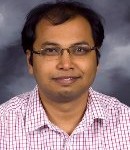 Engineering Physics graduate student Subhasish Mandal is a recipient of a Finishing Fellowship from the Michigan Tech Graduate School. The fellowships provide support to PhD candidates who are close to completing their degrees; they are available through the generosity of alumni and friends of the University.
Engineering Physics graduate student Subhasish Mandal is a recipient of a Finishing Fellowship from the Michigan Tech Graduate School. The fellowships provide support to PhD candidates who are close to completing their degrees; they are available through the generosity of alumni and friends of the University.
Congratulations to physics graduate student Matt Beals on receiving a NASA Earth and Space Science Fellowship. This prestigious award recognizes Beal’s achievements as well as the research performed using the HOLODEC detector. His proposal was entitled “Improved Mixed Phase Cloud Microstructure Measurements: The Holographic Detector for Clouds II (HOLODEC II).” The proposal basically outlined further characterization of the instrument and analysis of data from the flights the research team was involved with last fall at NCAR, the National Center for Atmospheric Research. Matt Beals is part of the Cloud Physics Laboratory, coordinated by Dr. Raymond Shaw.
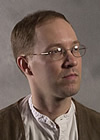 “Office hours” are an elastic concept for Michigan Tech’s 2012 Distinguished Teaching Award winners. “His office is always open,” says physics department chair Ravi Pandey of Will Cantrell, associate professor of physics, who received the award in the professor/associate professor category. “I’ve seen him here on Saturday and Sunday working with students.” Cantrell came to Michigan Tech in 2001, after serving as a postdoc in chemistry at Indiana University and completing his PhD at the University of Alaska Fairbanks. Pandey called Cantrell “a superlative model of the scholar-teacher.” READ MORE
“Office hours” are an elastic concept for Michigan Tech’s 2012 Distinguished Teaching Award winners. “His office is always open,” says physics department chair Ravi Pandey of Will Cantrell, associate professor of physics, who received the award in the professor/associate professor category. “I’ve seen him here on Saturday and Sunday working with students.” Cantrell came to Michigan Tech in 2001, after serving as a postdoc in chemistry at Indiana University and completing his PhD at the University of Alaska Fairbanks. Pandey called Cantrell “a superlative model of the scholar-teacher.” READ MORE